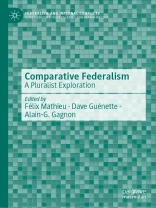This edited volume provides a solid yet accessible set of contributions for students, specialists and practitioners of federalism. It also reflects a commitment to normalising the connection between federal studies and scholarship on pluralism and diversity management. To shed light on a specific theme through a rigorous and comprehensive approach, most chapters compare at least two federal systems in connection with a given institutional matter or area of public policy.
Acknowledgements
The editors of the volume would like to extend their warmest thanks to the Programme d’appui à la recherche of the Secrétariat du Québec aux relations canadiennes, the Groupe de recherche sur les sociétés plurinationales, the Centre d’analyse politique – Constitution et fédéralisme, and the Canada Research Chair in Quebec and Canadian Studies. This project would not have been possible without their most generous support. The editors would also like to thank the entire editorial team at Palgrave Macmillan. In particular, they are grateful to Soeren Keil and Eva Maria Belser, who enthusiastically welcomed the present project into their Federalism and Internal Conflicts series, and to Ambra Finotello, Hemapriya Eswanth and Zeenathul Raeesa Ismail for their editorial support. They would also like to thank the anonymous reviewers who helped to improve the overall quality of this collective work.
– Félix, Dave, and Alain
Зміст
Introduction. The Renewal of Federal Studies and Comparative Federalism.- Chapter 1. The Philosophical Foundations of Federalism.- Chapter 2. Constitutional Asymmetry Through an Empirical Lens: A Federal Device for Diverse Systems.- Chapter 3. Multi-level Governance and the Reconfiguration of Political Space: Theoretical Considerations from a Multinational Perspective.- Chapter 4.“Federally Trapped”? Comparing and Contrasting Local Government in Federal Systems.- Chapter 5. Pluralised Constituent Power in Two Nominal Federations: Ethiopia and Iraq.- Chapter 6. Constitutional Referendums and Elite Cooperation in Western Federal Systems.- Chapter 7. Constitutional Justice in the Federal States of Europe.- Chapter 8. Power-Sharing as a Tool of Conflict Management: The Experience of Northern Ireland and South Tyrol.- Chapter 9. Party Politics in Contemporary Federal Systems.- Chapter 10. Fiscal Federalism in Theory and Practice: The Case of Income Supports in Australia and Canada.- Chapter 11. Federalism and the Protection of Fundamental Rights: Between Normalization and Subsidiarity.- Chapter 12. The Management of Immigration in Federal Systems.- Chapter 13. The Limits of Linguistic Diversity in a Federal Context: A Comparative View of Canada, Spain and Germany.- Chapter 14. Navigating Ethnopolitics in Deeply Divided Societies: Others in Regional Consociational Systems.- Chapter 15. How Does Federalism Affect Equality Rights Struggles … and How do Such Struggles Affect Federal Arrangements?.- Chapter 16. Federal Systems and the Fight Against Climate Change: A Comparative Analysis of India and Canada.- Chapter 17. Federalism and Secession: Taking Territorial Pluralism Seriously.- Concluding Remarks. Embracing Complexity and Promoting Pluralism in Comparative Federal Studies.
Про автора
Félix Mathieu is Associate Professor in the Department of Political Science at the University of Winnipeg, Canada.
Dave Guénette is Assistant Professor in the Faculty of Law at the Université de Sherbrooke, Canada.
Alain-G. Gagnon is Professor in the Department of Political Science at the Université du Québec à Montréal, Canada.












